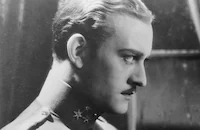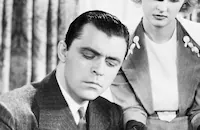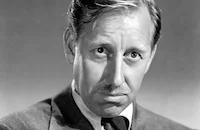The Vicious Circle
Cast & Crew
W. Lee Wilder
Conrad Nagel
Fritz Kortner
Reinhold Schunzel
Philip Van Zandt
Lyle Talbot
Film Details
Technical Specs

Synopsis
In 1882, in a Hungarian province, feudal landowner Baron Arady, a member of the Hungarian parliament, summons Gustav Horney, a local, small landowner, to his home and expresses his displeasure that Horney and other landowners are selling their land to "certain people." Horney tells him that the "people"--Jews--have always been honorable in their dealings with him, but Arady warns him that once parliament passes his bill to revoke the minority's citizenship and right to own land, it would probably be more profitable to Horney to sell to him. Some time later, five citizens of the Jewish faith are arrested in their homes and charged with murdering Horney's fourteen- year-old servant girl, Anna Tamashy, who was last seen in the barn of Joseph Schwartz, one of the accused, and is now missing. Anna is believed to have witnessed an argument Horney had with Schwartz when he attempted to repossess the farm from him. Arady hires Balog, a special investigator, to conspire with Miller, the assistant to the Royal District Attorney, to make certain that the defendants are found guilty. The defense lawyer, Karl Nemesch, a liberal member of parliament, takes the case for no fee. The prosecution, under Balog and Miller, presents such a parade of perjured witnesses and outrageously biased testimony that Stark, the Royal District Attorney, tenders his resignation, vigorously criticizing the travesty of justice. Unfortunately, this affords Miller and Balog the opportunity to produce more false testimony. Their major coup is that Arady has convinced Schwartz's fourteen- year-old son Samuel to testify against his father in exchange for new clothes and a promising future. Samuel states that he witnessed his father and the others kill the girl, through a keyhole in the door of his father's barn. With anger and grief, Schwartz denounces Samuel as a traitor to his own people and formally disowns him. In an age-old rite, Schwartz rends his clothing to indicate that his son has died. However, Nemesch proves that there was no keyhole in the barn door and produces a witness, Ethel Mihaly, known during the trial as "the woman in brown," who confesses that she was part of the prosecution's trumped-up case against Schwartz. This, coupled with the revelation that the prosecution has had the mother of the missing girl unjustifiably committed to a mental institution to prevent her from further testifying, destroys the prosecution's fraudulent case. Clara, Anna's sister, finally admits that she saw Anna jump into the river and drown. Anna had wanted to buy a new dress for an appointment with Arady, who was to teach her "piano lessons," but was depressed when Mrs. Horney did not pay her and, instead, beat her. Clara was jealous of Anna and made no effort to save her from drowning. The presiding judge clears the defendants of all charges and excoriates Arady, Balog and Miller and orders them held for investigation. Nemesch points out to the court that such bigoted attacks corrupt the structure of democratic institutions throughout the world. He is then able to effect a reconciliation between Samuel and his father, who leave the courtroom together.

Director
W. Lee Wilder
Cast

Conrad Nagel
Fritz Kortner
Reinhold Schunzel
Philip Van Zandt

Lyle Talbot
Edwin Maxwell

Frank Ferguson
Lester Dorr
Michael Mark
Belle Mitchell
Nan Boardman
Shirley Kneeland
Rita Gould
Eddie Leroy
David Alexander
Ben Welden
Nina Hansen
Mary Lou Harrington
Peggy Wynne
Robert Cherry
Sam Bernard
Rudolph Cameron

Peter Brocco
Christina Vale
Donald Harvey
Fred Fox
Manfred Furst
Reuben Wendorff
Herman Waldman
Paul Baratoff
Frank Cady
Harry Rose
Crew
Emanuel Barton
Asa Boyd Clark
Paul Dessau
James Doolittle
Guy Endore
Rudi Feld
Harvey Gould
Heinz Herald
Noel Langley
Ted Larsen
John F. Link
George Moskov
Ferol Redd
George Robinson
Fred Russell
Thomas Thompson
Ilona Vas
W. Lee Wilder
W. Lee Wilder
Mack V. Wright

Film Details
Technical Specs

Quotes
Trivia
Notes
The viewed print was titled The Woman in Brown, the 1950 reissue title of The Vicious Circle. The credits and summary were taken from a synopsis in the copyright registration for The Vicious Circle, which does not contain a full cutting continuity. Opening credits included the following written statement: "The events you are about to witness actually took place in Hungary in the year 1882. The characters you will meet, the arguments you will hear, can be found in the court records. This case, which created a profound interest throughout the world, has been altered only to conform to the demands and limitations of the screen."
The film's pressbook states that the character "Karl Nemesch" was based on Tomás Masaryk, father of the Czechoslovakian republic, who, while still a college professor, was convinced of the innocence of the accused and rallied the Czechs against the antisemites. In the play on which the film is based, the action is set in Nyiregyhaza, East Hungary in 1882-1883. The character names used in the film are different from those in the play. The film was not well-received and most reviews criticized its obvious theatrical origin. According to documents in the PCA files in the AMPAS Library, the film May have been shot at the Chaplin Studios under the title Shadows of Fire and, apparently, was originally to have been released through Republic.
A year after the film's release, the Hollywood Reporter reported that The Vicious Circle was to be recut to eliminate certain sequences and would have a new introduction shot. In mid-1950, that new version, entitled The Woman in Brown, was released. In the later version, the farmers were not identified as Jewish, and all references to the issue of antisemitism were removed, so that the film played as a simple mystery. In that version, the Baron wants the farmers removed because he has discovered oil on their lands. The 1950 version begins in an unidentified North American city. A man, "George Turner," who has been rooming with "Mr. and Mrs. Hogan" for years, is dying. The Hogans have never heard George talk and it has always been assumed that he was a mute, but on his death bed, he suddenly says, "Father, forgive me!" A visitor, "Stark," relates the story of the Hungarian trial in which he was the Royal District Attorney.
In the later version the trial ends as in the previous version, but with no reconciliation between the father and son. Stark reveals that he and the boy "Samuel," who testified against his father, left Hungary and came to the U.S. and that "George Turner" is Samuel, who has punished himself by never uttering a word until the day he died. In the revised version, Frank Ferguson repeated his role as Stark, Bill Baldwin played Samuel as an adult, and Mary Gordon and Fred Hoose portrayed Mrs. and Mr. Hogan. A number of scenes involving prosecution witnesses were apparently removed so that the second version, although it contained a new prologue and epilogue, actually ran about fourteen minutes shorter than the original. It is possible, however, that some of these cuts were made for a subsequent television release. In Austria, in 1947, G. W. Pabst directed a film, The Trial, based on the same incident. That film played in New York in March 1952.












